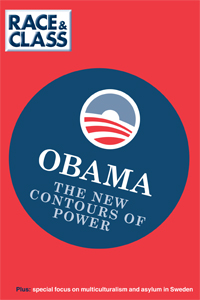Description
The October 2006 edition of the IRR journal Race & Class leads with Liz Fekete’s critique of the ‘enlightened fundamentalism’ of anti-immigrant feminists, continues with Jonathan Scott’s indictment of the US academy’s downgrading of Langston Hughes’ intellectual contribution, and carries a historical survey of the politics of Britain’s Asian Youth Movements by Anandi Ramamurthy. Also featured is playwright David Edgar’s defence of the right to be offended and an analysis of the US immigrant rights movement by William I. Robinson.
Enlightened fundamentalism? Immigration, feminism and the Right
Integration policies in Europe increasingly demand that Muslims demonstrate their acceptance of what are taken to be Enlightenment values. This cultural fundamentalism, once the preserve of the Right, is now in the mainstream of European politics. Liz Fekete describes how an ‘enlightened fundamentalism’ has found new supporters among some self-proclaimed feminists who, in their opposition to multiculturalism, have adopted an anti-immigrant politics that aggressively promotes stereotypes of Islam. Ironically, this feminist paternalism ends up supporting state racism and denying personal autonomy to Muslim women.
Langston Hughes – Patternmaster
In the US academy, Langston Hughes is considered a ‘Negro folk poet’. Yet, argues Jonathan Scott, Hughes was one of the most well-rounded writers and intellectuals of the twentieth century, ranked alongside Eliot and Yeats, in terms of overall intellectual influence within the English language and literature tradition. The downgrading of Hughes in the US academy is not only symptomatic of the endurance of white racial oppression in US society, but also extremely costly for students and scholars of American literature who have thus far been made familiar with only a fraction of his writings.
The politics of Britain’s Asian Youth Movements
The Asian Youth Movements (AYMs) of the 1970s and 1980s were powerful examples of political movements influenced by black politics and a version of secularism that became a unifying force between different religious communities. Drawing on interviews with participants in the youth movements and archive material of AYM ephemera, Anandi Ramamurthy contextualises the AYMs in the political history of Asians in Britain, analyses their distinctive political stance and describes the leaflets, magazines and posters which they produced.
Shouting fire: art, religion and the right to be offended
In recent years, fears about the influence of sexual and violent images, a growing concern for the victims of crime and emerging movements against the insulting of religions have widened the range of acceptable restrictions on freedom of expression in the arts. Leading playwright David Edgar argues that these new non-legal pressures rely on a blurring of the boundaries between representation and promotion, so that to dramatise is often seen as to condone. The author calls for a more complex approach, combining recognition of the value of artistic freedom with an understanding of why disadvantaged communities use the language of religion to protest.
‘Aqui estamos y no nos vamos!’ Global capital and immigrant rights
The recent mass demonstrations by millions of Latino immigrant workers in the US, against planned legislation that could lead to the criminalisation and deportation of, literally, millions of workers shook the Bush administration and took commentators by surprise. William I. Robinson argues that this movement, unprecedented in size and scope, challenges the structural changes bound up with capitalist globalisation and points to the necessity of transnational popular and democratic struggles against it.
Greece: policing racist violence in the ‘fenceless vineyard’
Drawing on interviews with Greek detectives, Georgios A. Antonopoulos examines the Greek police’s attitudes towards migrant communities and racist violence. Not only are migrant communities, particularly the Albanian, viewed as hotbeds of crime but racist violence against these communities is not viewed as a significant problem by the Greek police, who are usually indifferent to racially motivated crimes and often view racist incidents as acts of self-defence by Greeks against the criminal ‘other’.
Race & Class is published quarterly, in January, April, July and October, by Sage Publications for the Institute of Race Relations; individual subscriptions are £27/$47, for four issues, with an introductory rate of £20/$35 for new subscribers.



